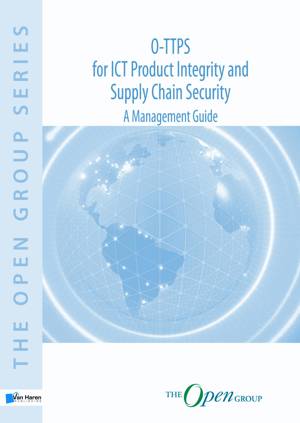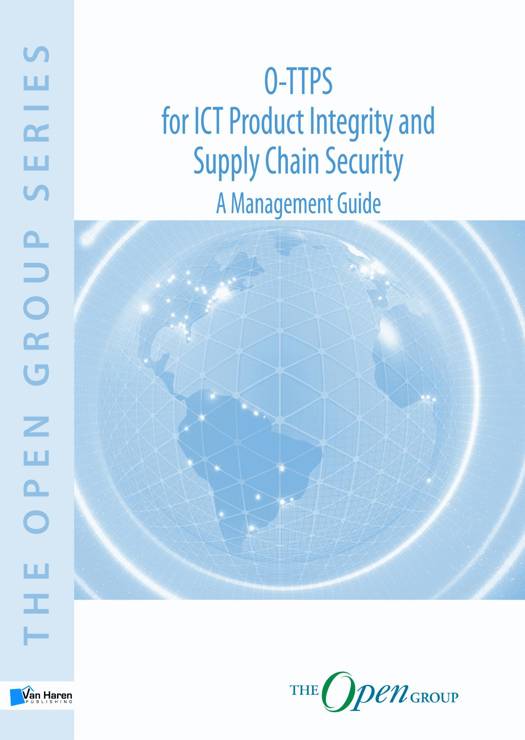
Bedankt voor het vertrouwen het afgelopen jaar! Om jou te bedanken bieden we GRATIS verzending aan op alles gedurende de hele maand januari.
- Afhalen na 1 uur in een winkel met voorraad
- Gratis thuislevering in België
- Ruim aanbod met 7 miljoen producten
Bedankt voor het vertrouwen het afgelopen jaar! Om jou te bedanken bieden we GRATIS verzending aan op alles gedurende de hele maand januari.
- Afhalen na 1 uur in een winkel met voorraad
- Gratis thuislevering in België
- Ruim aanbod met 7 miljoen producten
Zoeken
O-TTPS: for ICT Product Integrity and Supply Chain Security E-BOOK
a management guide
Sally Long, The Open Group Trusted Technology Forum
€ 30,14
+ 30 punten
Uitvoering
Omschrijving
This Management Guide provides guidance on why a technology provider should use the Open Trusted Technology Provider Standard (O-TTPS) - Mitigating the Risk of Tainted and Counterfeit Products (approved by ISO/IEC as ISO/IEC 20243:2015) and why they should consider certification to publicly register their conformance to the standard.
The O-TTPS is the first standard with a certification program that specifies measurable conformance criteria for both product integrity and supply chain security practices. The standard defines a set of best practices that ICT providers should follow throughout the full life cycle of their products from design through disposal, including their supply chains, in order to mitigate the risk of tainted and counterfeit components.
The introduction of tainted products into the supply chain poses significant risk to organizations because altered products can introduce the possibility of untracked malicious behavior. A compromised electronic component or piece of malware enabled software that lies dormant and undetected within an organization could cause tremendous damage if activated remotely. Counterfeit products can also cause significant damage to customers and providers resulting in rogue functionality, failed or inferior products, or revenue and brand equity loss.
As a result, customers now need assurances they are buying from trusted technology providers who follow best practices with their own in-house secure development and engineering practices and also in securing their out-sourced components and their supply chains.
This guide offers an approach to providing those assurances to customers. It includes the requirements from the standard and an overview of the certification process, with pointers to the relevant supporting documents, offering a practical introduction to executives, managers, and those involved directly in implementing the best practices defined in the standard.
As the certification program is open to all constituents involved in a product's life cycle this guide should be of interest to:
* ICT provider companies (e.g. OEMs, hardware and software component suppliers, value-add distributors, and resellers),
* Business managers, procurement managers, product managers and other individuals who want to better understand product integrity and supply chain security risks and how to protect against those risks and,
* Government and commercial customers concerned about reducing the risk of damage to their business enterprises and critical infrastructures, which all depend heavily on secure ICT for their day-to-day operations.
The O-TTPS is the first standard with a certification program that specifies measurable conformance criteria for both product integrity and supply chain security practices. The standard defines a set of best practices that ICT providers should follow throughout the full life cycle of their products from design through disposal, including their supply chains, in order to mitigate the risk of tainted and counterfeit components.
The introduction of tainted products into the supply chain poses significant risk to organizations because altered products can introduce the possibility of untracked malicious behavior. A compromised electronic component or piece of malware enabled software that lies dormant and undetected within an organization could cause tremendous damage if activated remotely. Counterfeit products can also cause significant damage to customers and providers resulting in rogue functionality, failed or inferior products, or revenue and brand equity loss.
As a result, customers now need assurances they are buying from trusted technology providers who follow best practices with their own in-house secure development and engineering practices and also in securing their out-sourced components and their supply chains.
This guide offers an approach to providing those assurances to customers. It includes the requirements from the standard and an overview of the certification process, with pointers to the relevant supporting documents, offering a practical introduction to executives, managers, and those involved directly in implementing the best practices defined in the standard.
As the certification program is open to all constituents involved in a product's life cycle this guide should be of interest to:
* ICT provider companies (e.g. OEMs, hardware and software component suppliers, value-add distributors, and resellers),
* Business managers, procurement managers, product managers and other individuals who want to better understand product integrity and supply chain security risks and how to protect against those risks and,
* Government and commercial customers concerned about reducing the risk of damage to their business enterprises and critical infrastructures, which all depend heavily on secure ICT for their day-to-day operations.
Specificaties
Betrokkenen
- Auteur(s):
- Uitgeverij:
Inhoud
- Aantal bladzijden:
- 83
- Taal:
- Engels
- Reeks:
Eigenschappen
- Productcode (EAN):
- 9789401800938
- Verschijningsdatum:
- 24/01/2017
- Uitvoering:
- E-book
- Beveiligd met:
- Digital watermarking
- Formaat:

Alleen bij Standaard Boekhandel
+ 30 punten op je klantenkaart van Standaard Boekhandel
Beoordelingen
We publiceren alleen reviews die voldoen aan de voorwaarden voor reviews. Bekijk onze voorwaarden voor reviews.












